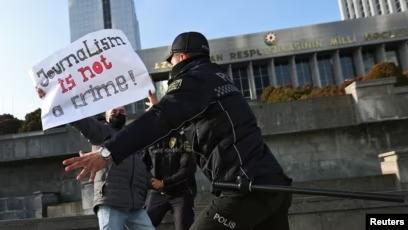Independent journalists in Azerbaijan are demanding the abolition of a newly created registry which they say is making it impossible to do their jobs.
It’s not clear whether the registry is mandatory or voluntary, but its very existence further erodes freedom of the press, they say, in what is already one of the world’s most repressive media environments.
In late January, a group of about 40 Azerbaijani journalists, media managers and lawyers issued a statement calling for the dissolution of the state media registry, which started operating in October under a law adopted in December 2021.
The law, whose stated aim is “the systematization of information,” calls for the registration of all Azerbaijani media outlets and all journalists as individuals. Certain criteria must be met as well: Journalists must have a higher education degree and possess a labor contract with their employer (a provision which could affect freelancers). And they must not be previously convicted of “grave crimes” or “crimes against public morality.”
Online outlets must be engaged in “constant activity,” which the law defines as “daily publication of at least 20 news for at least 20 days per month.” Their founders must be Azerbaijani citizens residing in the country permanently (many independent outlets are based abroad). And they must submit to the registry a list of their reporters, including their addresses and national ID numbers.
There is ambiguity around whether the registry is mandatory or voluntary. The law doesn’t use the word “mandatory” but it says that print and online media entities “must” apply for registration within six months after the establishment of the registry, which will fall on April 14, 2023.
On one hand, the Media Development Agency (Azerbaijani acronym MEDIA), the body overseeing the registry, says in the FAQ section of its website that applying for registration is voluntary: “Even without applying to the Media Registry, a person can carry out their journalistic activities without hindrance, using all the protection mechanisms defined by law.”
Yet on February 6, the executive director of MEDIA, Ahmad Ismayilov, said that his agency would hunt down media outlets not registered by the deadline and file suit against them in court. (The Riga-based independent media outlet Mikroskop reported that pro-government Trend.az originally attributed another sentence to Ismayilov’s quote – “And the court will rule that they must terminate their activities.” – but deleted it shortly afterwards.)
There are rewards dished out to those who register and problems faced by those who don’t.
The rewards come in the form of advertising orders by state agencies, free participation in state-sponsored training, and the provision of loans.
This naked attempt to co-opt would-be critical journalists is reminiscent of a state program introduced in 2013 to provide free apartments to journalists from both government-loyal and opposition-leaning outlets.
In the statement, the independent journalists reported that MEDIA has already refused to register more than 10 outlets which “have been operating for a long time, citing technical reasons.”
They elaborated on the consequences of failing to register.
“Currently, unregistered media and journalists are not even allowed to attend open sessions of the parliament, obstacles are created for journalists to carry out their professional activities in the regions of Azerbaijan,” they wrote.
Ulvi Hasanli, one of the signatories and executive director of the investigative outlet Abzas Media, told Eurasianet that he sees no point in attempting to register since “the law is just prohibitions from top to bottom.”
Abzas’ unregistered status has already hindered its work, though. Spokespeople of various state agencies refuse to talk to Abzas’ reporters or answer written inquiries, once they know that the outlet isn’t registered, he said.
Pro-government media, predictably, are supportive of the registry, and have launched a campaign against its opponents. In a piece titled “Fabrication of ‘free speech’ by those who don’t register,” news site Modern.az went so far as to suggest that signatories of the statement were working for Iran, where Azerbaijan’s embassy was attacked recently.
“For some reason, despite the fact that the main agenda item of the country is the terrorist attack in Iran and the rightful position of Azerbaijan, some secret hands reaching out to our country from abroad are busy confusing the situation by manipulating public opinion,” it read, going on to cite editors of several other pro-government news agencies attacking their colleagues for resisting registration.
The Venice Commission of the Council of Europe called for the law to be abolished in a report last June titled “Azerbaijan media law: overregulation in an already restrictive environment.” “The law attempts to regulate almost everything related to the media sector in Azerbaijan, including online media, and has a problematic focus on restricting the activities of the media rather than creating the necessary conditions enabling the media to fulfill their ‘public watchdog’ role,” the commission wrote.
The journalists who oppose the registry have started the hashtag #we_don’t_want_licensed_media on social media, and held their first public discussion on February 6.
“The law must be dismantled. Campaigns against the registry must continue. Having the law as it is now will create many problems for journalists, the government and society,” veteran journalist Arif Aliyev told the event.
Source: eurasianet


